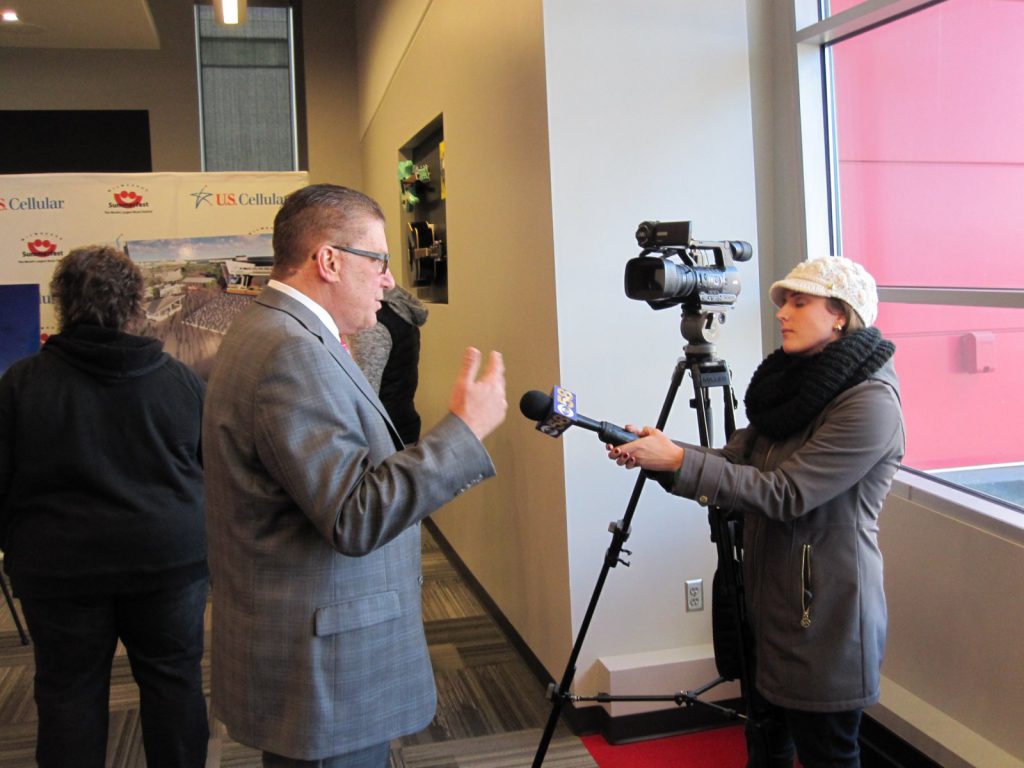Summerfest CEO Collects $2.49 Million
Don Smiley gets total compensation of 1.19 million in 2019 and $1.29 million in 2020.

Don Smiley speaks to the media. Photo taken December 8th, 2016 by Michael Horne.
Summerfest CEO Don Smiley continues to get paid at an unprecedented level, compared to past leaders of the festival, including himself. The annual federal tax form for the organization run by Milwaukee World Festivals (MWF) shows that Smiley got total compensation of $1.19 million in 2019 and $1.29 million in 2020.
That’s up from just under $744,000 in 2018 and $971,000 in 2017.
2017 was a particularly good year for Smiley because he was awarded an additional $1.37 million in deferred compensation for the years 2012 to 2016, which bumped his total compensation for that year to $2.3 million.
On the other hand Smiley probably did his best in 2020, when there was no Summerfest festival to oversee, due to the pandemic. The annual revenue of MWF dropped from $53.6 million to just $5.8 million and the organization posted a $15 million deficit. $1.29 million of that deficit paid for Smiley’s compensation.
All told, Smiley has been awarded nearly $3.5 million in “retirement and other deferred compensation” by the festival, a figure that likely increased significantly in 2021 and will be revealed in MWF’s next federal tax form.
City officials reacted with criticism to Smiley’s compensation.
“The level of compensation is so unequal when you compare to something, for instance like State Fair,” said Ald. Michael Murphy.
Smiley’s compensation in 2020 was nine times more than the annual salary of State Fair director Kathleen O’Leary, which was $140,130 that year. State Fair is actually a bigger event than Summerfest in terms of people served, with attendance of 1,130,572 people in 2019 during its 11-day run, versus just 718,444 people over 11 days for Summerfest in the year before the pandemic.
“The argument is always that you can’t get competent people without such compensation, but that’s obviously not the case when you look at State Fair,” Murphy added.
“This boils down to a board of directors that approves this kind of corporate compensation that you find in private companies,” said Ald. Robert Bauman. “The whole concept of Summerfest being a public-private entity, that’s long gone.”
Summerfest was founded by the City of Milwaukee, was heavily subsidized by the city (some $42 million through one TIF plan alone) in its early decades and still pays much lower rent for city land it uses than for-profit entities like Harbor House, as Urban Milwaukee has reported.
When asked to comment on Smiley’s salary, Summerfest offered the comments of an unnamed spokesperson who said this: “MWF’s executive compensation has been evaluated by an independent firm, Mercer. Mercer’s study took all job responsibilities into consideration when studying Mr. Smiley’s compensation, such as festival management, fund raising, construction management, facilities management, and the production of hosting over 35 annual events. The resulting package, including retirement benefits as well as deferred compensation, is aligned with the results of the study.”
Smiley’s predecessor, Elizabeth “Bo” Black, a legendary fundraiser who was previously the highest paid Summerfest CEO, topped out at just under $207,000 annual compensation, after 19 years of running the festival. The festival did a national search for her successor and felt it only needed to pay $225,000 to Smiley, a Kenosha native who moved from Florida after living there 20 years to take the job. Yet by 2012 his total compensation had jumped to $886, 885, and continued to rise, hitting $971,000 in 2017 and $1.29 million last year. Had his compensation risen at the rate of inflation it would now be $308,271.
The 25-member Summerfest board of directors has three members appointed by government: one each by the city’s mayor and Common Council president and one by the Milwaukee County Executive. But none of them serve on the board’s personnel committee that oversees Smiley’s compensation. Those on the committee include Board Chair Howard Sosoff, Chuck Harvey, Dan Minahan and Joanne Bischman.
Compensation for non-profits typically rise as the group’s size (in expenses and revenue) rises, while corporate compensation tends to rise in line with company revenue or market cap. According to Sosoff, who agreed to an interview with Urban Milwaukee after the organization first refused to answer any more questions, the revenues for MWF rose from $27.6 million in 2004 to $54.4 million in 2019. That’s an increase of 97%. During that same period Sosoff’s compensation rose by 429%.
And about one-third of the increase in Summerfest’s revenue during that period came from raising the ticket price, from $12 to $23, which raised the annual revenue by nearly $8 million.
In the last three years the rise in total compensation for Smiley has been driven by the portion going to retirement and deferred compensation, which was $233,154 in 2018, $666,291 in 2019 and $723,403 in 2020. At that rate of increase Smiley’s pay in that category could be hefty enough to drive his total retirement and deferred compensation since 2012 to more than $4 million.
Sosoff, however, cautioned that the total amount paid to Smiley could be lower or higher, as he is under a five-year contract for 2017 through 2021 whereby the retirement and deferred compensation payments are invested in the stock market and then given to Smiley at the end of the five years.
Sosoff said this is handled by “investment professionals” who do not report to the MWF board. Instead they report to MWF management, meaning Smiley. Sosoff later emailed to “clarify” that the investment professionals are overseen by board members and “Don Smiley is not involved in making these investment decisions.”
Whoever is making the decision, it should greatly increase Smiley’s pay day. The S&P 500 has grown in value by 102% over the last five years, which should add at least another $1 million to Smiley’s pot of deferred compensation.
As it has in the past, MWF refused to share the Mercer report on Smiley’s compensation and to give any examples of comparable salaries that it used to determine Smiley’s compensation. “No elements of this will be disclosed,” Sosoff said.
Mercer’s website notes that “its executive compensation consultants are trusted advisors to senior management of public and private companies and boards of directors.” Sosoff admitted that Smiley is being compared to leaders of for-profit companies, noting that “the job responsibilities are no different than at a private company.” He calls the tax-exempt, charitably-funded organization he oversees a “private corporation.”
Sosoff’s predecessor as MWF board chair, Ted Kellner, in the past defended the huge increases in Smiley’s pay, saying they were in line with that of for-profit corporate CEOs.
But on its federal tax form MWF describes its mission statement as follows: “A civic organization not organized for profit but operated exclusively for charitable and education purposes.”
In light of this, Bauman said “I hope somebody raises this issue with the IRS, as something it should investigate.”
Last week, Smiley purchased a Pewaukee lake home for about $1.64 million, as Alex Groth reported. “The property has 3,437 square feet and four bedrooms and three bathrooms.”
If you think stories like this are important, become a member of Urban Milwaukee and help support real, independent journalism. Plus you get some cool added benefits.
Political Contributions Tracker
Displaying political contributions between people mentioned in this story. Learn more.
Murphy's Law
-
Top Health Care Exec Paid $25.7 Million
 Dec 16th, 2025 by Bruce Murphy
Dec 16th, 2025 by Bruce Murphy
-
Milwaukee Mayor’s Power in Decline?
 Dec 10th, 2025 by Bruce Murphy
Dec 10th, 2025 by Bruce Murphy
-
Total Cost of Foxconn Is Rising
 Dec 8th, 2025 by Bruce Murphy
Dec 8th, 2025 by Bruce Murphy






















Brice, you’re batting 1000 on the Summerfest BS. No wonder he’s so smiley. Surprised he doesn’t dress better. Sosoff comes of as a real “winner.” Follow the money, b****es…
Thanks for another well written and informative article Mr. Murphy.
Ald Bauman was right on point when he said: “The whole concept of Summerfest being a public-private entity, that’s long gone.”
I also am suspicious of consulting work done by Mercer after their involvement in the infamous County pension backdrop.
The old cliché about needing certain salary levels to “attract and retain” top talent is repeatedly used by organizations to justify and perpetuate inflated executive compensation.
The Summerfest Board is out of control with overpaying Smiley and getting into the real estate development business with the new performing arts venue. City leaders need to take some actions to get the board to start acting responsibly.